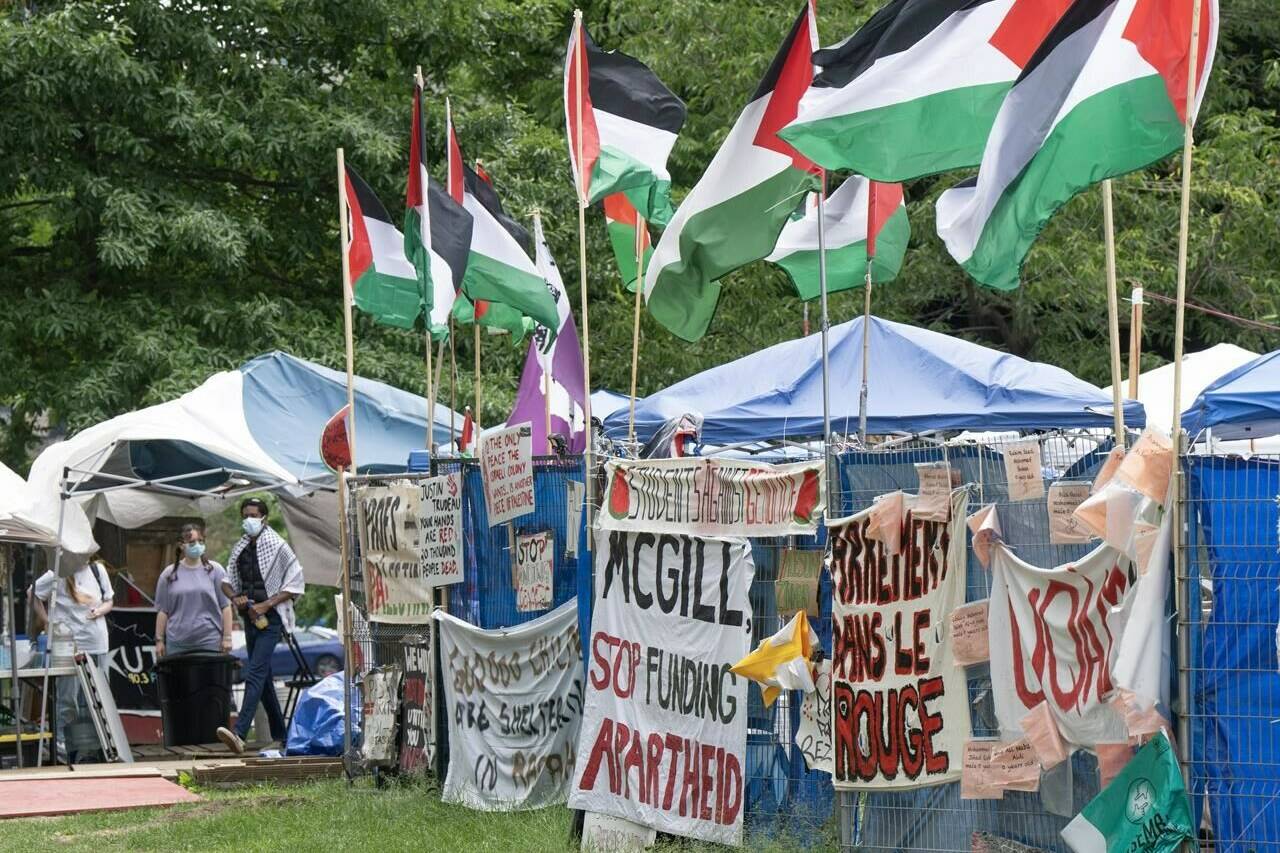Pro-Palestinian activists who have been encamped on McGill University’s downtown campus since April launched what they call their own summer school on Monday, despite controversy over photos of armed fighters used to promote the program.
The encampment’s youth summer program promises “revolutionary lessons” and political discussions over the next four weeks, including a series of lectures on Palestinian history, the resistance movement and the role of the media since the Oct. 7 Hamas attack on Israel.
But on Friday, federal and provincial politicians called for the encampment to be dismantled after posters for the summer program were published online featuring photos of Palestinian resistance fighters wearing kaffiyehs and holding rifles. The photos date from around 1970, and the militants appear to be reading copies of Chairman Mao Zedong’s “The Little Red Book.”
“Enough is enough, this is hate speech and incitement to hate, pure and simple!” federal Immigration Minister Marc Miller posted on X. “De-escalation at McGill has clearly failed. This needs to end!”
Quebec Higher Education Minister Pascale Déry said the poster was tantamount to “provocation, explicit incitement to violence, even indoctrination.”
Insp. David Shane of the Montreal police told reporters Monday that while the poster doesn’t target any particular group, “it’s clearly in very poor taste and it’s likely to make people feel unsafe.” He said police have opened an investigation and have “been in contact with the RCMP.”
Ahead of the first lecture at 4 p.m., people trickled into the encampment on the lower field of McGill’s downtown campus, some stopping at the entrance to watch a video about the Israel-Hamas war.
“It’s really good what they are doing,” one visitor said of the education program. The man, who gave only his first name, Abder, citing concerns for his safety, said he’s from Tunisia and sees the Palestinians as his brothers.
“We Muslims are like one community, one body,” he said. “It’s really important to support this cause.”
Organizers of the program, which will also include Arabic language classes and cultural crafts, defended the poster and said interest in the teachings has been high.
“We’re defying the norms of normal academia. We want to teach things that aren’t normally taught,” Zaina Karim, a spokesperson for the encampment, said in an interview Monday. “The overarching goal is to educate.”
Karim called the summer school a form of “revolutionary education.” She said speakers will include Palestinian intellectuals and some professors from McGill and Concordia universities.
In a statement Friday, McGill president Deep Saini said that in response to the poster for the youth program, the university would increase security near the encampment. “This is extremely alarming,” he said. “It has attracted international media attention, and many in our community have understandably reached out to express grave concerns — concerns that I share.”
But Karim said the group has no regrets about its choice of photo. “It’s a historical image showing a colonized people reading about another colonized people,” she said. “It’s a symbolism between education and struggle.”
As of Monday morning, online registration for the summer program had closed. Karim said 50 to 80 people have signed up for the first week of lectures, which will take place every afternoon. Organizers, she added, were surprised by the number of registrants, and may open up more spots in the weeks to come.
Most of the attendees will be students, Karim said. “[They] were really interested in the idea of being able to come here and get educated on Palestine.”
Members of the encampment have said they will not leave until McGill ends its investments in companies tied to the Israeli military and cuts ties with Israeli institutions. The university has made offers to protesters, the most recent of which included to review its investments in weapons manufacturers and grant amnesty to protesting students. Members of the encampment rejected that offer, calling it “laughable.”
Two injunction requests were filed in May to have the protest encampment dismantled — one by McGill students and another by the university itself — and both failed because applicants could not prove the situation at the encampment was sufficiently urgent. McGill has moved to the next phase of the injunction process, seeking an interlocutory order to evict the protesters, but the case has not yet been heard.
On June 6, police arrested 15 people after a group of protesters broke into the university’s main administration building and officers used chemical irritants to disperse a crowd outside. Shane said 13 people could face charges of break and enter, while two could face charges of obstructing a police officer, but the investigation is continuing.
For now, Shane said, the presence of the encampment remains a “civil dispute,” and it will be up to a court to decide between two fundamental rights that are in conflict: property rights and freedom of speech.
“We need legal foundation to intervene — right now we don’t have that,” he said.
READ ALSO: ‘Troubling’ escalation, as 15 arrested during Palestine Occupation at McGill

